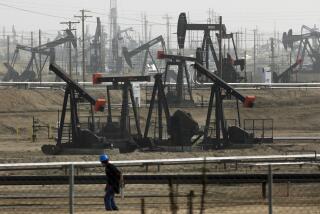Oil Firms See a Grim Year Ahead : Energy: Capital spending plans will be flat, executives said. Stiff regulations, the prospect of a continuing weak economy and low natural gas prices are cited.
- Share via
HOUSTON — Stiff environmental regulations, the prospect of a continuing weak economy and low natural gas prices are expected to make 1992 a dismal year for the oil industry, which is already suffering one of its worst years ever, executives of several major companies said Monday.
Capital spending plans, a key indicator of the industry’s overall health, will be the same or slightly below 1991 levels, the executives said.
In addition, employment--which has already been cut dramatically at several companies--may fall further if no strong recovery is in sight, said executives attending the annual get-together here of the American Petroleum Institute, the industry’s chief trade group.
The industry’s sluggish spending plans will probably continue a trend toward investment overseas instead of in the United States, where production is declining and imports of foreign oil make up as much as 54% of total consumption.
This trend will probably spell greater dependence on foreign oil, loss of U.S. jobs and a further ballooning of the U.S. trade deficit, executives said. Foreign oil makes up a substantial portion of the deficit.
“I would say that every company in this business is going to be very dynamic,” said Allen E. Murray, chairman of Mobil Corp. and outgoing chairman of the American Petroleum Institute. “Chances are, if activity falls off, people fall off, it’s going to be that simple. And activity is going to fall off unless the U.S. government does something.”
Executives blamed squeezed cash flow from this year’s poor earnings, which resulted in part from record low natural gas prices, as well as slack demand for petroleum products and chemicals because of the recession.
Next year, several industry officials expected to have to come up with the high costs of refinery modifications that will be required under proposed new regulations to implement the Clean Air Act, which will require the reformulation of gasolines.
“Most of our companies are looking at their costs. If you can’t control the price of the product, you’ve got to control your costs, or try to find out ways we can do business at a lower cost,” said C. J. (Pete) Silas, chairman of Phillips Petroleum Co.
“As we keep getting more and more cost-related regulations and laws, we’re trying to find ways to do our business more efficiently and effectively . . . and unless you do, you’re not going to survive the ‘90s anyway,” added Silas, who is also the newly elected chairman of the American Petroleum Institute. Next year’s spending plans would mark a departure from 1991, when the 14 major oil companies increased capital spending 14.4% in the first three quarters, according to the trade paper Oil Daily.
“The industry’s not making much money these days, and it’s hard to increase your spending if your earnings are going down,” said Kenneth T. Derr, chairman of Chevron Corp. “We really have a difficult problem in deciding what our budgets are going to be. . . . It probably won’t be below this year, but I don’t know.”
In keeping with industry trends, Derr said his company would spend more in overseas development and production than in the United States, particularly now that Congress has failed to authorize new oil drilling in Alaska’s Arctic National Wildlife Refuge.
“People complain somewhat because . . . where we used to spend more than half in the U.S., now we spend more than half overseas,” he said. “But it’s pretty simple: The areas that are still undrilled or untested in the U.S. that might have sizable reserves . . . we can’t drill.”
But Derr would not speculate on further cuts in Chevron’s employment, which has already shrunk under a couple of years of restructuring.
Richard Stegemeier, chairman of Los Angeles-based Unocal Corp., said his company’s capital budget would likely resemble this year’s $1.4 billion, with about two-thirds going to exploration and production and the other third to refining and marketing operations.
“Our capital spending budget this year will be directed somewhat more than in the past toward development budgets than in exploration projects, so there will be a slight reduction in exploration, both domestic and foreign,” he added. In the United States, Unocal will spend money to develop its sizable natural gas reserves.
As major oil companies cut back, so will oil service companies. “In the U.S., the level of activity will depend a lot on natural gas prices,” said Thomas H. Cruikshank, chairman and chief executive of the energy service firm Halliburton Co. “We won’t know until we get through this winter and see how we’re responding.”
Halliburton has already cut its work force by about 2,000 and is moving others to overseas offices, Cruikshank said. Should things turn up, he doubted any of those jobs would come back.
RELATED STORY: D9
More to Read
Inside the business of entertainment
The Wide Shot brings you news, analysis and insights on everything from streaming wars to production — and what it all means for the future.
You may occasionally receive promotional content from the Los Angeles Times.










